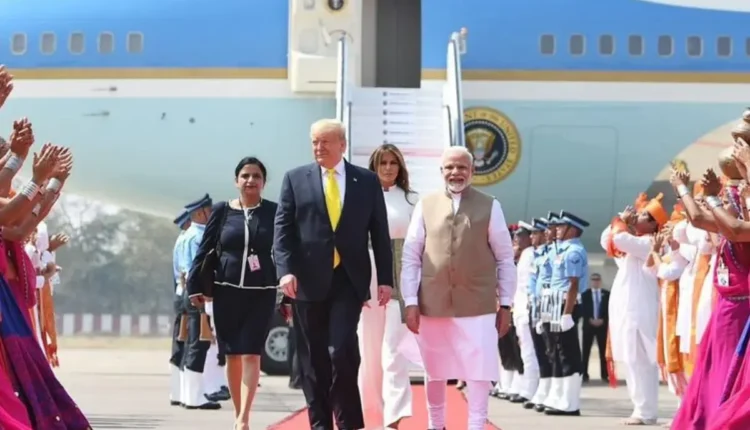Trump 2.0 and India-US Ties: What a New Trump Era Means for Bilateral Relations
Modi Congratulates Trump as India Prepares for Strategic Shifts in US Foreign Policy
In a historic turn of events, Donald Trump is poised to enter the White House once again, sparking global speculation about the impact on US foreign relations. With Trump’s return, the world’s eyes are on the potential shifts in policy, especially regarding the India-US relationship.
As a major strategic partner of the US, India faces both opportunities and challenges across key areas, including trade, immigration, military cooperation, and diplomacy. Given Trump’s vocal admiration for Prime Minister Narendra Modi, it’s expected that personal ties could influence this critical partnership in unique ways.
PM Modi Congratulates on Victory
Shortly after Donald declared victory in the 2024 US Presidential Election, Prime Minister Narendra Modi took to social media to extend his congratulations. PM Modi expressed his commitment to strengthening the bond between the two nations, emphasizing the importance of the India-US partnership in promoting global peace, stability, and prosperity.
In a message posted on X, Modi stated, “Heartiest congratulations my friend @realDonaldTrump on your historic election victory. As you build on the successes of your previous term, I look forward to renewing our collaboration.”
This camaraderie between Modi and Trump was displayed prominently in events such as “Howdy, Modi!” in Houston in 2019 and “Namaste Trump” in Ahmedabad in 2020, where both leaders showcased their mutual respect and shared vision. Trump’s admiration for Modi’s leadership style has been clear, with Trump describing Modi as a “total killer” in a podcast, indicating a mix of respect and recognition for Modi’s decisive leadership.
Navigating Trade Relations Under Trump 2.0
Trade experts are bracing for potential shifts in India-US trade relations, with Donald’s “America First” agenda likely to play a central role in his second term. Ajay Srivastava, founder of the Global Trade Research Initiative (GTRI), speculates that Trump’s policies may lead to higher tariffs on imports, including those from India. Trump has previously referred to India as a “tariff king” and could seek a more protectionist stance that prioritizes American industries.
This stance may impact key sectors for Indian exports to the US, including automobiles, textiles, and pharmaceuticals, which could face heightened customs duties. However, if Trump’s policies continue to target China’s dominance, India may have the chance to position itself as an alternative supply source, creating fresh opportunities for Indian exporters.
H-1B Visa Policies: A Key Concern for Indian Workers
One of the most closely watched issues among the Indian workforce is the H-1B visa, a gateway for skilled professionals in fields like technology, engineering, and science. Trump has previously voiced concerns about the H-1B program, which he views as a potential threat to American jobs. In his first term, his administration pushed for a rule to raise the minimum wage for H-1B workers, which was ultimately blocked.
With Trump’s renewed focus on immigration, stricter H-1B regulations could be on the horizon, raising concerns for Indian IT firms and professionals. For India’s technology sector, which earns over 80% of its export revenue from the US, any changes to H-1B policies could impact both costs and growth, potentially pushing companies to explore alternative markets or remote work models.
Strengthening Defense and Military Cooperation
The India-US defense partnership has strengthened significantly in recent years, with multiple defense agreements and joint exercises highlighting their mutual interests in regional security. Trump’s second term could further bolster this relationship, especially as both nations seek to counterbalance China’s influence in the Indo-Pacific. India is a major buyer of American military equipment, and Trump’s focus on strengthening US manufacturing could encourage more military technology sharing with allies like India.
Diplomacy and Geopolitical Implications
Trump’s renewed presidency may challenge India’s balancing act in international diplomacy. Known for his unconventional foreign policy moves, Trump could encourage India to align more closely with US geopolitical interests, particularly in regions where China’s influence is growing. India might face new expectations to support US-led initiatives, possibly including the Indo-Pacific Economic Framework (IPEF), which Trump may push as an alternative to China-centric trade networks.
However, Trump’s approach could also mean a scaled-back US involvement in multilateral organizations like the World Trade Organization (WTO), impacting global trade rules. For India, this may require recalibrating its strategies within these organizations, while also adapting to any shifts in US-backed frameworks.
Growing Trade and Economic Engagement
In the last five years, India-US trade in goods has grown substantially, with bilateral trade standing at $120 billion in 2023-24. India has become one of America’s top trading partners, with US businesses heavily invested in India’s services, manufacturing, and IT sectors. With US firms like Google, Facebook, and Amazon earning significant revenue from India, the economic interdependence between the two nations is deeper than ever.
Despite potential challenges, Trump’s policies may also present economic opportunities for India. Trump’s preference for looser environmental and labor regulations could benefit Indian exporters, while sectors such as electronics and pharmaceuticals might experience growth if the US encourages sourcing alternatives to China. Additionally, India’s increasing demand for advanced technology and capital goods from the US could drive further bilateral trade.
EAM Jaishankar on the Resilience of India-US Ties
India’s External Affairs Minister S. Jaishankar recently shared his confidence in the resilience of India-US relations. Reflecting on the steady progress made over five consecutive presidencies, Jaishankar emphasized that the India-US partnership would continue to grow, irrespective of the electoral outcome. “We have seen steady progress in our relationship with the US over the last 5 presidencies,” he stated. This outlook suggests that, despite potential policy shifts, the foundational strength of India-US relations remains intact.
Also Read:Fifi Sharma: Embracing the Challenges to Rise as a National Volleyball Icon

